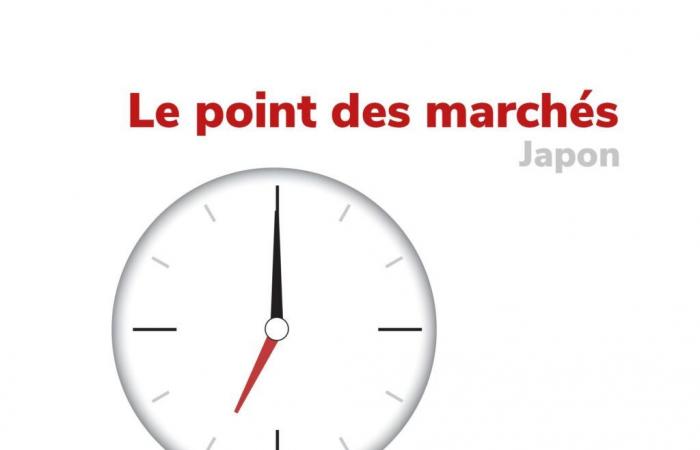The flagship Nikkei index closed down 0.80% at 38,134.97 points and the broader Topix index fell 0.90% to 2,665.34 points, after both had already lost around 1%. the day before.
Asian stock markets are generally in decline on Wednesday while the dollar catches its breath, in markets digesting the announcement by President-elect Donald Trump of increases in American customs duties.
Withdrawal in Tokyo, exporters plunge
In unison with the Seoul market, the Tokyo Stock Exchange fell again in a market still shaken by the prospect of increased trade tensions.
The flagship Nikkei index closed down 0.80% at 38,134.97 points and the broader Topix index fell 0.90% to 2,665.34 points, after both had already lost around 1%. the day before.
Donald Trump announced Monday evening that he would increase customs duties on Mexican and Canadian products to 25%, and increase those on Chinese products by 10% in addition to any taxes he could add.
Enough to cast a chill on Asian economies like Japan, whose main trading partner is China and which fear being targeted in turn by customs taxes from Washington.
“Caution following Mr. Trump’s announcements continues to weigh on the market, which should remain held back by investors’ distrust” with regard to stocks deemed to be at risk, underline the experts at Tokai Tokyo Intelligence.
Enough to penalize Japanese car manufacturers with factories in Mexico or exporting to the United States, such as Toyota (-3.61%) or Honda (-3.03%).
The other major exporting companies also suffered, against a backdrop of the strengthening of the yen, which made their prices less attractive: Panasonic (-2.56%), Nikkon (-3.50%), Shiseido (-%).
The dollar stabilizes, the yen resists
Faced with threats of customs duties, the Mexican peso tumbled on Tuesday to its lowest level since August 2022 against the US dollar, losing up to 2.5%, and the Canadian dollar had plunged to levels not seen in four and a half years. .
The two currencies tried to stabilize on Wednesday in Asian trade: the Canadian dollar lost 0.14% (to 1.4074 Canadian dollars per US dollar) and the Mexican peso was standing still (+0.07%) around 06:50 GMT .
The American currency continued to gain ground against the common European currency, at 1.0479 euros per dollar (+0.08%).
Faced with uncertainties, the yen benefited from its status as a safe haven and continued to strengthen against the greenback: the dollar traded at 152.10 yen (-0.64%).
Above all, while the Bank of Japan is preparing to raise its interest rates again in December and the American Fed is engaged in a “gradual” lowering of its rates, the yield gap between the two countries “will continue to widen.” encourage investors to sell their dollars to buy back yen,” underline the experts from the financial media Nikkei.
Chinese markets boosted by a good indicator
Under pressure in the face of customs taxes announced by Donald Trump, Chinese stock markets rebounded on Wednesday after an indicator showing that losses in the industrial sector had slowed somewhat last month.
A signal considered reassuring in a still gloomy economic situation, where operators are watching the effects of Beijing’s recovery measures.
In Hong Kong, the Hang Seng index climbed 1.61% to 19,467.97 points around 06:50 GMT. The Shanghai composite index gained 1.31% to 3302.55 points, and that of Shenzhen 1.68% to 1988.94 points.
Truce agreement in Lebanon: oil and gold without reaction
Oil prices no more than gold prices, although very sensitive to fluctuations in geopolitical crises, did not react to the ceasefire agreement in Lebanon between Israel and Hezbollah.
Around 06:50 GMT, the price of a barrel of Brent from the North Sea gained 0.16% to 72.93 dollars, and that of West Texas Intermediate (WTI) 0.10% to 68.87 dollars.
The oil market was supported by the approach of a crucial OPEC+ meeting, where major producing countries could delay increasing their production, maintaining tensions on global supply.
An ounce of gold climbed to $2,648 (-0.57%) after having plunged sharply on Monday.
“There was no significant movement following the confirmation of the approval of a truce agreement (by Israel), which suggests that this scenario had already been largely priced in by the market,” explains Chris Weston, of broker Pepperstone. .






